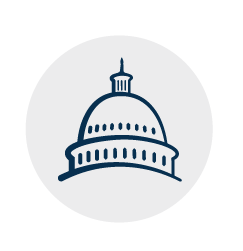House Passes Build Back Better Act
Today, after months of uncertainty, the House passed its version of the Build Back Better (BBB) Act by a predominantly party line vote of 220 to 213. Jared Golden (D-ME) was the only Democrat voting against the bill. Among its many important provisions, the $1.7 trillion package includes an $11.716 billion investment in the LIHTC program and $150 billion in funding for affordable housing and community development. The action now formally shifts to the Senate where discussions are ongoing among Senate Democrats to craft a bill that all Democrats can support. Given the 50-50 split and Senate Republicans united in opposition to the BBB Act, all 48 Democrats and two Independents need to be on board.
While House and Senate Democrats and the White House have been working closely together on the BBB legislation, it is anticipated that the Senate bill will make a number of changes to the House bill. To that end, we have been working alongside our industry partners to urge the Senate to include significant proposals to expand and improve the LIHTC program. We also have commented on and suggested changes to the House bill to further enhance affordable housing production. We know it will be tough to add or change provisions that lose revenue, but we are encouraged by the strong support of our Senate champions for including a meaningful housing credit package in the final bill.
Given the significant coordination between the House and Senate, we expect the House LIHTC provisions to be the base for Senate consideration. The House bill includes the following affordable housing credit provisions:
· Increases the annual 9 percent credit allocation by 10 percent plus annual adjustments for calendar years 2022-2024. The increases include the 12.5 percent increase enacted in 2018 that is scheduled to expire at the end of this year. In 2025, the cap would decrease to $2.65 per capita or $3,120,000. Inflation adjustments are provided after 2025.
· Reduces the “50 percent bond financing test” to 25 percent for five years (2022-2026).
· Provides a permanent 30 percent basis boost for properties located in Native American areas.
· Provides a permanent maximum 50 percent basis boost for developments serving extremely low-income households, with an 8 percent minimum set aside for ELI properties taking advantage of the boost. The basis boost option for 9 percent LIHTC properties would be limited to no more than 13 percent of the state’s housing credit ceiling. For 4 percent properties, no more than 8 percent of a state’s annual Private Activity Bond cap can be used.
In addition, the bill includes the following provisions:
· Repeals the Qualified Contract option for properties receiving LIHTC allocations after January 1, 2022, and modifies the specified statutory price for those properties that still make use of the qualified contract option.
· Modifies and clarifies rights related to building purchases (Right of First Refusal).
· Creates a Neighborhood Homes Investment Tax Credit to encourage building or rehabilitation of affordable homes (for home ownership) in distressed neighborhoods.
· Creates a New Markets Tax Credit for low-income communities in tribal areas.
· Allows the Section 48 Energy Tax Credit to be taken on renewable energy equipment without reducing the eligible basis for the LIHTC.
We will keep you posted on developments in the Senate, but bringing the BBB Act to a floor vote is going to take time. Congress will be out for Thanksgiving and upon its return will need to deal with several critical deadlines – including funding the federal government to avoid a shutdown and addressing the debt limit so the government can meet its obligations.
As we approach this critical juncture in the legislative process, we want to thank you for all you have done to help garner support for a strong affordable housing package. You make a difference, so keep up the good work! We wish you and your family a very Happy Thanksgiving.

